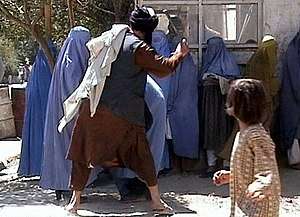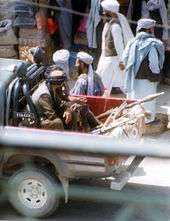Islamic religious police
The Islamic religious police (Arabic: مطوع muṭawwiʿ, plural, مطوعون muṭawwiʿūn (nom) and مطوعين muṭawwiʿīn (acc and gen) – derived from classical Arabic: mutaṭawwiʿa/muṭṭawwiʿa)[1] is the official vice squad of some Islamic states, who on behalf of the state, enforces Sharia law in respect to religious behavior (morality),[2][3] or the precepts of Wahhabism.[3] The establishment of a religious police is considered justified with the Quran doctrine, enjoining what is right and forbidding what is wrong or promotion of virtue and prevention of vice.[2][3] Some controversy, though, exists and opinions are divided on the function or purpose of religious police;[2][3] for example, in Iran and Saudi Arabia some see them as limiting secularization, while some foreign Islamic imams see them as an outdated over-conservative annoyance.[3]
Names
The word mutaween (Arabic: المطوعين, translit. muṭawwiʿīn; variant English spellings: mutawwain, muttawa, mutawallees, mutawa'ah, mutawi', mutawwa') most literally means "The one who makes others obey" in the Arabic language,[4] and is commonly used as a casual term for the government-authorized or government-recognized religious police (or clerical police) of Saudi Arabia. The term is derived from the Semitic root ṭ-w-ʿ, relating to "obedience." It was originally a casual synonym for the religious police of Saudi Arabia. The formal short term for the Saudi religious police is هيئة "hay'ah".
More recently the term has gained use as an umbrella term outside the Arabic-speaking world to indicate religious-policing organizations with at least some government recognition or deference which enforce varied interpretations of Sharia law. The concept is thought to have originated from Wahhabism in Saudi Arabia.[5] However, the use of religious police was prevalent during Taliban rule as a means to promote their fundamentalist interpretation of Deobandi Islam.
Activities by country
Iran
Guidance Patrol (Persian: گشت ارشاد, Gašt-e Eršād; also known as Guidance Patrol[6]) is the main Islamic religious police, or vice squad in the Law Enforcement Force of Islamic Republic of Iran, established in 2005[7] (succeeding previously defunct institutions with the same task) with the task to impose Islamic dress codes and norms of conduct in public, particularity regarding the hijab of women (but also some men)[8] who are deemed improperly dressed according to the dress code. In addition, the patrol also enforces Islamic codes of conduct in public, such as preventing the mingling of unrelated men and women without a male guardian (mahram) for the latter, and preventing other types of behavior that are un-Islamic.
Saudi Arabia
The Mutaween in Saudi Arabia, formed in 1940,[6] are tasked with enforcing Sharia as defined by the government, specifically by the Committee for the Promotion of Virtue and the Prevention of Vice (CPVPV). The Mutaween of the CPVPV consists of "more than 3,500 officers in addition to thousands of volunteers... often accompanied by a police escort." They had the power to arrest unrelated males and females caught socializing, anyone engaged in homosexual behavior or prostitution; to enforce Islamic dress-codes, and store closures during the prayer time. They enforced Muslim dietary laws, prohibited the consumption or sale of alcoholic beverages and pork, and seized banned consumer products and media regarded as anti-Islamic (such as CDs/DVDs of various Western musical groups, television shows and film which has material contrary to Sharia law or Islam itself). Additionally, they actively prevented the practice or proselytizing of other religions within Saudi Arabia, where they are banned.[9][10]
Among the things the Mutaween have been criticized or ridiculed for include the use of flogging to punish violators,[11][12] banning Valentines Day gifts,[13][14] arresting priests for saying Mass,[9] and being staffed by "ex-convicts whose only job qualification was that they had memorized the Qur'an in order to reduce their sentences".[15]
Perhaps the most serious and widely criticized incident attributed to them occurred on March 11, 2002, when they prevented schoolgirls from escaping a burning school in Mecca, because the girls were not wearing headscarves and abayas (black robes), and not accompanied by a male guardian. The firemen who arrived on to help, were also males. Fifteen girls died and fifty were injured as a result. Widespread public criticism followed, both internationally and within Saudi Arabia.[16]
Under the Saudi program Saudi Vision 2030, Crown Prince Mohammad bin Salman has introduced several reforms to the religious police, as well as extended liberties for women: The religious police may only work during office hours, cannot detain or make arrests, and may only submit reports to civil authorities.[17] In addition, the Mutaween can no longer restrict women from driving,[18] nor can they prohibit women from attending sporting events.[19]
Afghanistan


Afghanistan's Committee for the Propagation of Virtue and the Prevention of Vice was first instituted by the 1992 Rabbani regime, and adopted by the Taliban when they took power in 1996.[20] It was closed when the Taliban was ousted, but the Chief Justice of the Supreme Court of Afghanistan reinstated it in 2003.[21] In 2006 the Karzai regime submitted draft legislation to create a new department, under the Ministry for Haj and Religious Affairs, devoted to the "Promotion of Virtue and Prevention of Vice".[20]
Sudan
The Community Service Police serves as the Sudanese religious police. Originally called the Public Order Police, the enforcement agency was established in 1993 by President Omar al-Bashir.[6] The Public Order Law was initiated by the Sudanese government in the state of Khartoum in 1992, and later applied to all states. The name was changed in 2006. The Community Service Police is in charge of enforcing regulations on certain personal behaviors, including indecent clothing, alcohol consumption, offensive acts and seduction, among others.[22] In June 2015, 10 female students were charged with "indecent dress" after exiting their church. All of the women were wearing long-sleeved shirts and either skirts or trousers.[23] In December 2017, 24 women were arrested at a private gathering for wearing trousers. They were later released.[24] Punishment can include flogging and the payment of fines. The Public Order Court, which handles such cases, is a parallel court system which exercises summary judgements.[25]
Malaysia
The Malaysian religious authority, known as the Federal Territories Islamic Religious Department (JAWI), enforces religious standards.[26] Its Chief of enforcement is Wan Jaafar Wan Ahmad.[27] Punishable offenses include khalwat, the offense of being in close proximity to any forbidden member of the opposite sex. Adultery is also an offense and may lead to up to two years in prison. According to local newspapers, the moral police have stopped hundreds of couples.[28] Other offenses include extra-marital sex, alcohol consumption, not fasting during Ramadan, and not visiting the mosque during Friday prayer. The department also punishes gay Muslims.[29]
Other countries
Other less prominent Islamic religious police forces include:
- Polisi Syariat Islam of Indonesia's territory of Nanggroe Aceh Darussalam
- Committee for the Propagation of Virtue and the Prevention of Vice (Gaza Strip)
- Islamic religious police of the Chechen Republic of Ichkeria
- Kano State Hisbah Corps in Nigeria's Kano state
- General Presidency of Religious Affairs and Welfare of the Ummah, an international organization based in the United States.
Syrian rebels
A religious police called al-Hisba operates in Idlib, which is ruled by Syrian rebels linked and allied to Al-Qaeda.[30][6]
ISIL
The militant group ISIL has employed the use of religious police in areas under its control, commonly known as the Hisbah.[31]
See also
References
- ↑ The Encyclopaedia of Islam. New Edition. Brill, Leiden. Vol. 7, p. 776
- 1 2 3 Sultan, Sohaib (2004). The Koran For Dummies. Hoboken, New Jersey: John Wiley & Sons. pp. 238–40, 246. ISBN 978-0-764-55581-7.
- 1 2 3 4 5 Cordesman, Anthony H. (2003). Saudi Arabia Enters the Twenty-first Century: The military and international security dimensions. 1. Westport, Connecticut: Praeger Publishers. pp. 294–96, 298. ISBN 978-0275980917.
- ↑ Wehr, Hans (1994). Cowan, J.M., ed. Dictionary of Modern Written Arabic (4th ed.). p. 670. ISBN 978-0879500030.
- ↑ Rashid, Ahmed (2001). Taliban: Militant Islam, Oil and Fundamentalism in Central Asia (1st Pan ed.). London: Pan Books. p. 105. ISBN 978-0330492218.
- 1 2 3 4 "Who are Islamic 'morality police'?". BBC News Online. 22 April 2016. Retrieved 2 July 2018.
- ↑ Erdbrink, Thomas (7 May 2014). "When Freedom Is the Right to Stay Under Wraps". The New York Times. Retrieved 12 August 2016.
- ↑ Sharafedin, Bozorgmehr (20 April 2016). "Rouhani clashes with Iranian police over undercover hijab agents". Reuters. Retrieved 12 August 2016.
- 1 2 "Catholic priest arrested and expelled from Riyadh". AsiaNews. 10 April 2006. Retrieved 13 November 2014.
- ↑ "Saudi minister rebukes religious police". BBC News. 4 November 2002. Retrieved 13 November 2014.
- ↑ Feldner, Yotam (8 January 2004). "The Saudi Media Debates Flogging by the Saudi Religious Police". Middle East Media Research Institute. Retrieved 13 November 2014.
- ↑ "Saudi Arabia: Gross Human Rights Abuses Against Women" (PDF). Amnesty International. 27 September 2000. Retrieved 2 July 2018.
- ↑ Schwartz, Stephen; al-Alawir, Irfan (5 March 2007). "Valentine's Day in Saudi Arabia". The Weekly Standard. Vol. 012 no. 24. Retrieved 13 November 2014.
- ↑ "200 Arrested in Mina for Celebrating Valentine's Day". Arab News. 18 February 2004.
- ↑ Wright, Lawrence (2006). Looming Tower: Al Qaeda and the Road to 9/11. New York: Knopf. p. 149. ISBN 978-0375414862.
- ↑ "Saudi police 'stopped' fire rescue". BBC News. 15 March 2002.
- ↑ Chan, Sewell (15 April 2016). "Saudi Arabia Moves to Curb Its Feared Religious Police". The New York Times. Retrieved 18 April 2018.
- ↑ Hubbard, Ben (26 September 2017). "Saudi Arabia Agrees to Let Women Drive". The New York Times. Retrieved 18 April 2018.
- ↑ "Saudi women should not have to wear abaya robes, top cleric says". BBC News. 10 February 2018. Retrieved 18 April 2018.
- 1 2 Esfandiari, Golnaz (18 July 2006). "Afghanistan: Proposed Morality Department Recalls Taliban Times". Radio Free Europe. Archived from the original on 28 October 2008. Retrieved 28 October 2008.
- ↑ Franco, Claudio (7 December 2004). "Despite Karzai election, Afghan conservatives soldier on". Eurasianet. Archived from the original on 4 August 2008. Retrieved 4 August 2008.
- ↑ "More than 40,000 public order cases annually in Sudan capital: SDFG". Dabangasudan.org. 7 January 2018. Retrieved 18 April 2018.
- ↑ Eltahawy, Mona (19 August 2015). "The Middle East's Morality Police". The New York Times. Retrieved 18 April 2018.
- ↑ "Sudanese women arrested 'for wearing trousers' released". The New Arab. 11 December 2017. Retrieved 18 April 2018.
- ↑ Köndgen, Olaf (30 October 2017). The Codification of Islamic Criminal Law in the Sudan: Penal Codes and Supreme Court Case Law under Numayri and al-Bashir. Brill. p. 85. ISBN 978-9004357082.
- ↑ "Mustafa Akyol: Jawi didn't like my talk on commonalities between Islam, Christianity". Malay Mail. 28 September 2017. Retrieved 18 April 2018.
- ↑ "Jawi ramps up Ramadan enforcement". Malaysiakini. 28 May 2017. Retrieved 18 April 2018.
- ↑ "Malaysia: The sordid failures of the illicit sex police". The Independent. Singapore. 18 February 2017. Retrieved 18 April 2018.
- ↑ Salvá, Ana (22 February 2017). "Here comes the Malaysian morality police". The Diplomat. Retrieved 18 April 2018.
- ↑ McKernan, Bethan (16 February 2017). "Syrian schoolgirl arrested by religious police for 'inappropriate clothing' freed after classmate protest". The Independent. London. Retrieved 2 July 2018.
- ↑ Charters, Justen (11 August 2014). "Life Under ISIS Religious Police is Brutal and Merciless". Independent Journal Review. Retrieved 18 April 2018.
Further reading
- Cordesman, Anthony H. (2003). Saudi Arabia Enters the Twenty-first Century: The military and international security dimensions. 1. Westport, Connecticut: Praeger Publishers. ISBN 978-0275980917.
External links
| Wikiquote has quotations related to: Religious police |
- "Sharia police block women's rally". BBC News. 19 January 2009.
- Simanjuntak, Hotli (8 February 2010). "Sharia police: who are they?". The Jakarta Post.
- Mahamud, Faiza (13 April 2017). "Minneapolis Muslims protest 'sharia' vigilante in Cedar-Riverside area". Star Tribune.